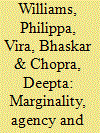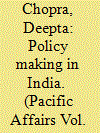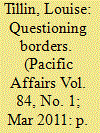|
|
|
Sort Order |
|
|
|
Items / Page
|
|
|
|
|
|
|
| Srl | Item |
| 1 |
ID:
103170


|
|
|
|
|
| Publication |
2011.
|
| Summary/Abstract |
The idea of the state has shown remarkable resilience over the last couple of decades, despite assaults on it from neoliberal doctrines and the forces of globalization. During this period, the abiding presence and role of the state has been particularly evident in the contemporary political life of the Asia Pacific region. This article pays special attention to the contemporary Indian state in the context of development. It reflects upon the ways in which the state is experienced, by focusing on questions of marginality, agency and power as they intersect the politics of development. By reading the empirical insights documented within this special issue against a rich trajectory of scholarship on the Indian state, the article argues that there has been a recent qualitative change in the way in which the contemporary Congress-led UPA government has presented itself to the common person. The implementation of pro-poor and more inclusive policies has altered the discursive landscape within which state-society interactions have taken place over the last five years. Importantly, these policies have functioned to reconfigure not only the material interactions between the state and India's marginalized, but also the imagined spaces within which marginal groups renegotiate their relationships with the state.
|
|
|
|
|
|
|
|
|
|
|
|
|
|
|
|
| 2 |
ID:
103174


|
|
|
|
|
| Publication |
2011.
|
| Summary/Abstract |
This paper problematizes the concept of the state by studying its role and interactions with society in the realm of making policy. To achieve this, the case of a recently formulated social policy in India, the National Rural Employment Guarantee Act (NREGA), is examined. The paper provides empirical evidence of policy making as a complex and iterative process, which is mediated by a multiplicity of actors who operate in relation to each other. In tracing the formulation process of the NREGA, theoretical claims regarding the understanding of the state as an ideological construct as well as comprising of material practices are substantiated. The paper sees policy making as an act of governing, and contributes to ethnographic understandings of fuzzy and porous boundaries between the state and society that are redefined through the act of policy making. This dynamism, it is argued, results in the two-dimensional phenomenon of statecraft: how the state pursues policy making as a strategy for governing its population, and in turn, how the state itself gets reconstituted in the making of policy.
|
|
|
|
|
|
|
|
|
|
|
|
|
|
|
|
| 3 |
ID:
103173


|
|
|
|
|
| Publication |
2011.
|
| Summary/Abstract |
As the world's largest multi-ethnic democracy, India has a federal constitution that is well-equipped with administrative devices that offer apparent recognition and measures of self-governance to territorially concentrated ethnic groups. This article analyzes how demands for political autonomy-or statehood-within the federal system have been used as a frame for social movement mobilization. It focuses on the most recent states to have been created in India: Chhattisgarh, Jharkhand and Uttarakhand, which came into being in 2000. These are the first states to have been created in India on a non-linguistic basis. Their creation has triggered questions about whether the creation of more, smaller states can improve political representation and help to make the state more responsive to diverse needs in India. This article draws attention to the processes which have brought borders into question, drawing social movements and political parties into alignment about the idea of creating new states. It ultimately looks at why the creation of states as a result of such processes may not lead to more substantive forms of political and economic citizenship on the part of marginalized communities. While the focus of the analysis will be on the processes that led up to statehood, the conclusions offer some insights into why pro-poor policy shifts at the national level in India have uneven regional effects. Despite the change in national political regime in India with the election of the Congress-led United Progressive Alliance in 2004, marginalized groups in India continue to experience the state through the refractive lens of multiple regional political histories.
|
|
|
|
|
|
|
|
|
|
|
|
|
|
|
|
| 4 |
ID:
103172


|
|
|
|
|
| Publication |
2011.
|
| Summary/Abstract |
The first phase of the Community-Based Monitoring of Health Services program of the National Rural Health Mission has seen involvement of civil society actors at every stage, from the formation of policy in Delhi to program implementation in villages across the country. For many of the civil society actors involved, the program presents a unique opportunity to advance their rights-based agendas from within the government system by making creative and innovative use of the spaces that the program opens. In the implementation of the program by people's organizations in tribal areas of Maharashtra, "innovations" have been introduced that go beyond the scope of the guidelines set in Delhi; these have been dubbed "community monitoring plus."
Drawing upon actor-network theory and recent work in the anthropology of development, this paper explores the dynamics, achievements and tensions of "community monitoring plus" through a narrative that travels the length of the policy process. The analysis describes how categories such as "state," "civil society" and "community" are constructed within spaces of policy and practice, and examines the crucial enabling role that such constructions play in the policy process. The necessity of such constructions leads to a disconnect between policy making and implementation, so that policy makers remain ignorant of the realities of implementation practice and subordinate actors can carve out spaces for carrying out their own agendas around and against the policy framework. The implications of the analysis extend beyond the case study, as the dynamics described are also features of policy processes elsewhere.
|
|
|
|
|
|
|
|
|
|
|
|
|
|
|
|
| 5 |
ID:
103171


|
|
|
|
|
| Publication |
2011.
|
| Summary/Abstract |
This article draws from detailed fieldwork on the recent conservation-induced displacement of a Maharashtrian village in central India to contest the simplicity of conventional treatments of such displacement as a straightforward enactment of state power. Reflecting certain broader theories of power, agency and the state, the case of Botezari village presents a more nuanced reality in which state-society relations were transformed and retransformed. In the village's pre-relocation phase, a set of conducive factors came together to create a small opening which enabled a fundamental reworking of familiar state-oustee power relationships. This opening was ultimately short-lived, with spaces of oustee opportunity to direct change largely closed off in the post-relocation context. However, the villagers' memories of their pre-relocation liberating moment, and the strategic capacity, confidence and expectations honed in that moment, persisted to an extent that challenges the permanency and inevitability of displacement-induced marginalization in the conservation setting.
|
|
|
|
|
|
|
|
|
|
|
|
|
|
|
|
|
|
|
|
|